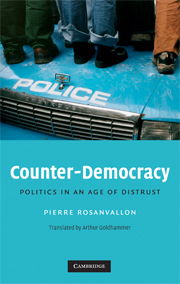Book contents
8 - Historical references
Published online by Cambridge University Press: 24 May 2010
Summary
The Greek example
Aristotle writes: “A citizen in the strictest sense … shares in the administration of justice and in offices.” More specifically, a citizen is one who exercises the functions of a juror (dikastes) and who participates in the assembly (ekklesiastes). For the author of Politics, judging and voting are inextricable aspects of citizenship. The tribunal of the people (dikasteria) and the assembly of the people (ekklesia) were both central institutions of Athenian democracy; they complemented each other. Some six thousand citizens came together in the assembly thirty or forty times a year to make decisions about domestic and foreign policy. In the tribunals, juries of 201, 401, or 501 individuals chosen by lot settled disputes over both public and private actions. Both institutions allowed for direct, active participation in civic life.
The relation between these two functions becomes clearer when we look at the activities in which the Athenian tribunals engaged – activities that were fairly political in nature. The difference between their role and the role of courts of justice in a modern democracy is immediately apparent. In our political systems, the courts are responsible for resolving civil disputes and judging criminal cases. These matters take up most of their time. There is, to be sure, a more political side of judicial activity: for instance, in resolving disputes between citizens and government agencies and, still more, in judicial review of the constitutionality of laws (where such procedures exist).
- Type
- Chapter
- Information
- Counter-DemocracyPolitics in an Age of Distrust, pp. 195 - 213Publisher: Cambridge University PressPrint publication year: 2008



